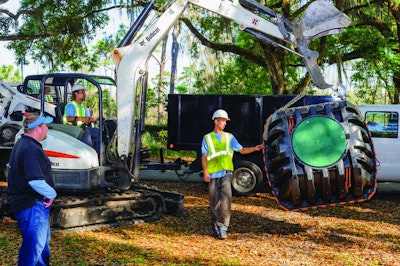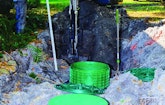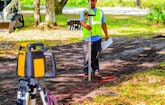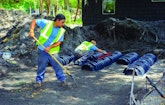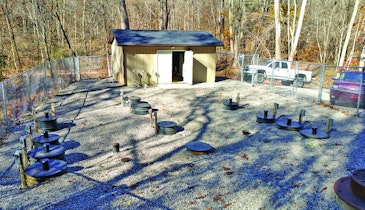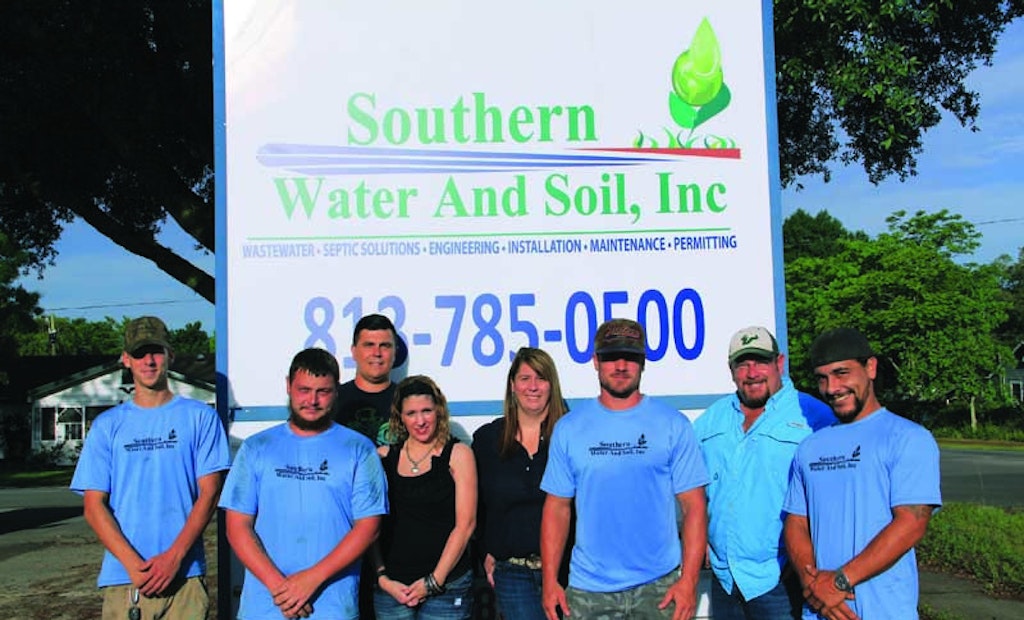
Interested in Septic Tanks?
Get Septic Tanks articles, news and videos right in your inbox! Sign up now.
Septic Tanks + Get AlertsGreg Mayfield of Zephyrhills, Florida, found his life’s passion in high school. His love of soils led him to a graduate certificate in hydrogeology (the study of aquifers and how water flows through soil and rocks) and employment as a registered environmental health specialist in the onsite section of the Florida Department of Health.
In 2001, while working as a registered sanitarian and hydrologist for the Southwest Florida Water Management District, Mayfield moonlighted nights and weekends testing soils and designing onsite systems for general contractors. Three years later, he was doing 40 soil tests per weekend and working 18-hour days. “Not only was the pace killing me, but I was losing money at my day job,” he says.
The jump to opening Southern Water and Soil in 2005 wasn’t hard. Mayfield already had a second income and an employee digging holes, testing soils and answering the phone in his absence. As Mayfield established the company’s niche – repairing residential and commercial drainfields – its reputation for solving complex problems spread from Florida to North Carolina and, recently, Virginia.
EXPEDIENT SERVICE
Mayfield initially accelerated the permitting process by creating complete project packages for the health department to review. Contractors never complained about paying $250 more than the department charged if it helped them break ground faster. When projects such as service stations, churches, fast food restaurants and strip malls required 1,000-square-foot drainfields or larger, Mayfield turned to district engineer Bob Dasta to stamp the designs.
To reach homeowners and homeowner associations, Mayfield joined Angie’s List. Once Southern Water repaired a system in a neighborhood, referrals brought in seven or eight more jobs over the next two years. “All those drainfields were installed around the same time, and they fail in series,” he says.
Southern Water, licensed in Florida and North Carolina, owns a Bobcat E50 excavator, Bobcat T650 skid-steer and a fleet of F-series Ford trucks. A local fabricator built a vacuum truck with a 2,000-gallon steel tank and Jurop/Chandler pump to expedite pumpouts at repairs.
Mayfield designs many residential systems with Singular (Norweco) aerobic treatment units discharging to Geoflow drip tubing or Infiltrator chambers. He prefers low-pressure dosing to Multi-Pipe systems (Plastic Tubing Industries) for drainfields larger than 1,000 square feet. To boost revenue further and consolidate components, he acquired distributorships from Norweco, Infiltrator Water Technologies, Tuf-Tite, Bear Onsite and Orenco Systems.
SILVER LINING
Then the economy crashed in 2008, and people restricted their money to essentials. With septic systems low on their priority lists, Mayfield struggled to keep his company afloat.
In 2009, he heard the owner/main salesman of a local onsite company was ill. The business specialized in replacing drainfields in RV parks. Mayfield offered to help the family sell jobs and received a 10 percent commission for testing soils and pulling permits. “Instead of making $250 working for myself, I made $500 a job,” he says.
The situation lasted a year, but it enabled Mayfield to keep his nine employees. It also opened the door to working for RV park and mobile home companies. Today, installing new systems accounts for 20 percent of the company’s work; the remainder is repairs.
“Our revenue is 80 percent commercial and 20 percent residential,” says Mayfield. “We do 10 residential repairs while waiting for the next commercial contract.” The company does a few large projects a year.
Southern Water’s first major project – and to date the largest – was Tropical Palms Resort and Campground in Kissimmee, Florida. Such facilities often have ponds called rapid infiltration basins into which treated effluent is discharged. “A basin wasn’t percolating,” says Mayfield. “By redirecting 30 percent of the flow to 180,000 feet of Geoflow drip tubing, we came in $100,000 below another contractor’s bid.” It took two months to install the 8-acre drainfield, and the job put the company on the map.
Mayfield, 40, says their quotes are competitive because there is no middleman. They do the engineering and the installation, and distribute the products. “Lumping all our assets under one umbrella streamlines quotes,” he says. “We never low-ball prices.”
TARGETS HIGH-END PROJECTS
After 10 years of repairing other contractors’ onsite systems, Mayfield attributes many failures to cheap components and careless installations. Wishing to avoid a clientele concerned with only the bottom line, his business targets high-end residential and commercial customers. Experience has taught him the more affluent do research and are easier to educate, therefore his primary marketing tool is Google.
Mayfield’s sales presentation explains every replacement product and why it’s important. “Homeowners don’t know about control panels and alarms,” he says. “They’ve never heard of passive aeration or effluent filters. By educating them about components and how they differ in quality, they understand why our system costs $3,000 more than standard drainfields.”
He also explains that some drainfields fail because contractors installed the minimum square footage – a common condition. A recent service call involved a new five-bedroom disability home with nine occupants and a 400-square-foot drainfield. It failed in 18 months.
“The flow required a 1,000-square-foot bed,” says Mayfield. “Adding seven laterals 12 chambers long cost $6,000. Our regulatory system isn’t working when owners have to pay for two drainfields in two years.”
Each job concludes with Mayfield reviewing the final paperwork with the homeowners. His package includes a list of components with model numbers, a pamphlet on what not to put in the system, and an as-built AutoCAD drawing. “The health department uses a generic form to diagram systems less than 1,000 square feet,” he says. “The tank is somewhere over here and the drainfield is out in that direction. Our customers and their service providers know exactly where everything is.”
RESORT CHALLENGE
Keeping the service board full in the company’s 1,200-square-foot shop/office often depends on the weather. In the dry season, systems behave and work slows, but problems reveal themselves during the June to September monsoons. “It’s the worst time to repair systems, because we’re fighting rain and smearing soils,” says Mayfield. “Our inspectors exacerbate the situation by wanting the entire drainfield installed and open before they come out. That can compromise our work.”
One such challenging install was replacing the drainfields at Sawmill Resort and Campground in Dade City, Florida. Eight septic systems were located around the park. Mayfield consolidated them into a 5,000 gpd system and a 2,000 gpd system, but no one knew which of almost 150 laterals connected to what tank.
The sanitary survey took a week to complete using a VIPER (Medit Inc.) inspection system. Two months later, Mayfield had his permit. “We hired a directional drilling company to shoot a 6-inch bore under two rows of mobile homes, through the easement and beneath roads to the dripfield, then pull back the return lines,” says Mayfield.
Workers built the four-zone 5,000 gpd irrigation field on a sand pit containing primitive tent sites, then R.J. Ricardo of Element Landscape in Tampa laid sod. “We landscape properties to leave them looking better than before we excavated,” says Mayfield. “If R.J. is busy, we team up with Mike Baltromitis and Travis Tooker of CLS Ground Care Co., in Port Richey.”
EXPAND TERRITORY, DIVERSIFY
Being the go-to contractor for three mobile home companies soon had Southern Water crews in North Carolina. To handle the ample work, Mayfield occasionally teams with Steve Barry, president of AQWA in Wilson, North Carolina. “Inspectors here are more diligent and watchful than their Florida counterparts, enabling us to backfill what we install each day,” says Mayfield.
Earlier this year, Southern Water installed its first system in Virginia, a 50-lot expansion at an RV park. Workers partnered with Cody Vigil of Infiltrator Water Technologies in Greenville, Virginia, to streamline the project.
Besides rapid infiltration basins, most commercial properties and resort parks also have stormwater ponds, and both clog eventually. The maintenance rocket went up for Southern Water when it saved a homeowner association $47,000. “They usually hired a dredging company hauling to a landfill,” says Mayfield. “We were the first to drain the pond, rototill the muck, remove 12 inches, and raise and stabilize the banks with it. Then R.J. sodded everything.”
The Villas at Spanish Oaks, a mobile home park in Ocala, Florida, required another innovative solution. Rains of 6 inches or more caused the stormwater pond to overflow, flooding the 6,000-square-foot clubhouse pavilion. After replacing the ruined floors, carpeting and walls for the third time since 2008, the owners wanted a solution.
“They couldn’t enlarge the pond without displacing the surrounding lots and losing revenue,” says Mayfield. He designed a bypass system pumping up 20 feet to a 77- by 45- by 90-inch-long drainfield that watered a common area. Installing 9,000 square feet (a half acre) of StormTech, a Division of ADS, chambers took almost three weeks. “The pavilion is safe now from everything but a hurricane,” he says.
PLENTY OF OPPORTUNITY
Mayfield expects growth to continue as more park owners seek to consolidate multiple hodgepodge systems into one, or the clock runs out on residential drainfields and those undersized for the families they serve. “Despite an uncertain economy, repairs keep us busy,” says Mayfield. “I credit my trusted employees for our success. They never take shortcuts and are vested in this company and its advancement.”
